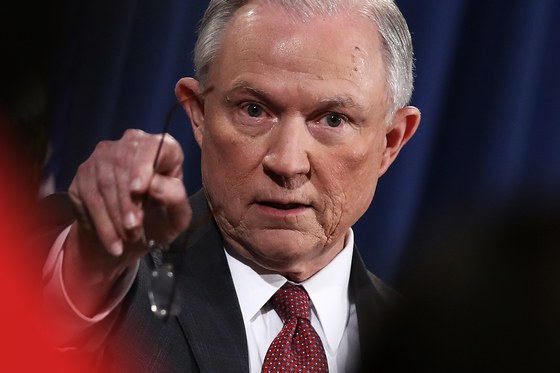
by John Schuppe (NBC NEWS)
The Trump era of drug enforcement has officially arrived, and it sounds a lot like the old days.
The message came this week in the form of a memo from Attorney General Jeff Sessions to all federal prosecutors: Stop seeking leniency for low-level drug offenders and start seeking the toughest penalties possible.
That’s what federal authorities used to do, when the war on drugs fueled the passage of mandatory minimum sentencing laws. But under former President Barack Obama, the Justice Department tried to rein in the use of those statutes, which advocates say were used disproportionately against minorities and led to massive prison overcrowding.
For those who’d embraced a bipartisan movement to end harsh sentencing policies, reduce prison costs and focus on rehabilitating drug offenders, the attorney general’s directive puts the country in danger of repeating an old mistake.
“It can’t be emphasized enough that the direction they’re pointing is 180 degrees wrong,” said David Alan Sklansky, a former federal prosecutor who now teaches at Stanford Law School.
But for prosecutors who bristled at the Obama administration’s approach, the Sessions memo is a refreshing return to the times when prosecutors felt empowered to use all their power to prosecute drug dealers and combat drug trafficking.
Mandatory minimum sentences, passed during 1980s, forced judges to impose lengthy prison terms for drug trafficking, a move that contributed to drops in crime but also put a lot more people in prison.
Researchers now say that mass incarceration’s impact on the crime rate has ebbed, and that the length of a prison sentence matters less in deterring crime than the likelihood of punishment. And the result is millions of nonviolent ex-offenders — a disproportionate number of whom are black — were essentially locked out of the economy.
During the Obama administration, federal officials tried various ways to chip away at mandatory minimums. One significant step came in 2013 from then-Attorney General Eric Holder. In a series of memos, Holder ordered federal prosecutors to focus on high-level dealers and avoid charging low-level, nonviolent offenders with crimes that carried the stiffest sentences.
Since then, the proportion of federal drug offenders sentenced under mandatory minimum laws has dropped dramatically, mirroring a broader decline of all federal prison sentences. Accordingly, the federal prison population has declined to the lowest point since 2005.
On Friday, Sessions rescinded two key Holder memos — one telling prosecutors to show lenience for low-level nonviolent drug offenders, and a second, from 2014, restricting the use of a law that toughened sentences for repeat offenders.
Any prosecutor who seeks to deviate from the new policy, Sessions said, must get permission from a supervisor, in writing.
“If you are a drug trafficker, we will not look the other way,” Sessions said at a press conference .
Critics said Sessions was limiting prosecutors’ discretion to seek punishment they felt fit the crime.
Holder responded with a sharply critical statement. “These reversals will be both substantively and financially ruinous, setting the Department back on a track to again spending one third of its budget on incarcerating people, rather than preventing, detecting, or investigating crime,” he said.
Brett Tolman, who served as United States Attorney for Utah under President George W. Bush and President Obama, said the Sessions memo “pulls U.S. Attorney offices back into that mentality or atmosphere where we thought we didn’t have a choice, and didn’t have any other option, but to charge the highest provable offense, regardless of what the very telling circumstances of your prosecution.”
He recalled as an example a pregnant woman who agreed to drive a friend’s car across the country, not realizing a secret compartment was loaded with methamphetamine. She was arrested in Utah, and despite having no criminal history, and knowing nothing about the drug operation she unwittingly helped, received a sentence of more than 10 years in prison.
“That’s exorbitant,” Tolman said.
The increased use of the sentencing enhancement for repeat offenders is also risky, Tolman said. He said the law is written to include prior state-level convictions, which opens offenders up to unfairly harsh penalties.
A U.S. Sentencing Commission analysis of the enhancement statute, known as an 851, found that it was used disproportionately against black drug offenders.
Several civil rights groups blasted Sessions’ move. The NAACP Legal Defense and Educational Fund said Sessions had “turned back the clock on our criminal justice system, ensuring it will continue to disproportionately punish Black people.” The American Civil Liberties Union said Sessions was asking prosecutors to return to policies that “have already cost us too much.”
Douglas Berman, a law professor and sentencing expert at The Ohio State University, pointed out that the Sessions memo should not come as a surprise, because it reflects policies that Trump campaigned on, and ones Sessions has favored.
“My sense is that Sessions will not only be proud of this change back to what had been the pre-Holder tradition, but he will likely work harder to ensure it’s implemented and enforced effectively around the country,” Berman said.
He emphasized that prosecutors still have the ability to seek shorter sentences in some circumstances, particularly if an offender has agreed to cooperate with investigators. And revised sentencing guidelines give judges some leeway too.
Berman also stressed that many prosecutors are happy to see the new direction — even if it is an old one. There were “plenty of factions” in the Justice Department who were troubled by Holder’s approach, Berman said.
That included members of the National Association of Assistant U.S. Attorneys, whose former president, Steve Cook, is now one of Sessions’ top advisers. The organization put out a statement Friday praising Sessions’ memo.
“The new guidance announced by Attorney General Sessions will restore the tools that Congress intended Assistant U.S. Attorneys to have at their disposal to prosecute drug traffickers and dismantle drug trafficking enterprises,” the group said.

Be the first to comment